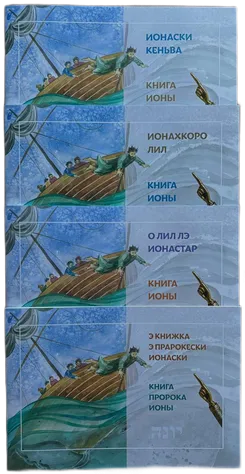IBT continues to publish books in four dialects of the Romani (Gypsy) language — Vlax, Servi, Crimean, and Lovari. Recently, an illustrated edition of the Book of Jonah was released in these languages. Earlier in 2024, this translation was published as part of the volume Genesis, Ruth, Jonah in these dialects.
The book tells the story of the prophet Jonah, who, seeking to avoid God's command to go to Nineveh and call its people to repentance, flees aboard a ship bound for Pharsis. However, for his disobedience, he ends up in the belly of a huge fish, which spews him onto the shore after three days. Realizing his mistake, Jonah fulfills God's will: he goes to Nineveh, and after his preaching, the people repent, saving the city from destruction. The prophet reproaches the Lord for being overly lenient with the enemies of Israel, but God reminds him that divine mercy for the lost is greater than human anger.
The concise yet thought-provoking narrative and vivid imagery are reflected in the colorful illustrations accompanying the biblical story. Additionally, the translations into Romani dialects in each of the four editions are supplemented with parallel Russian text (NRT— a modern Russian translation), which will be helpful for those unaccustomed to reading in their native language.
The Romani language belongs to the Indo-Aryan branch of the Indo-European languages, with its closest relatives being the languages of India and Pakistan. Romani is classified as a macrolanguage, encompassing several closely related dialects. For the Romani translation in Russia, four of the most widespread dialects were chosen: Vlax, Lovari, Crimean, and Servi. According to census data, around 205,000 Roma live in Russia, with over 80% of them speaking Romani. The translation was carried out by Pioneer Bible Translators in collaboration with experts and native speakers of these dialects.
The PDF version can be found on our site, where previous editions — Genesis, Ruth, Jonah, and the Gospel of John — are also accessible.

